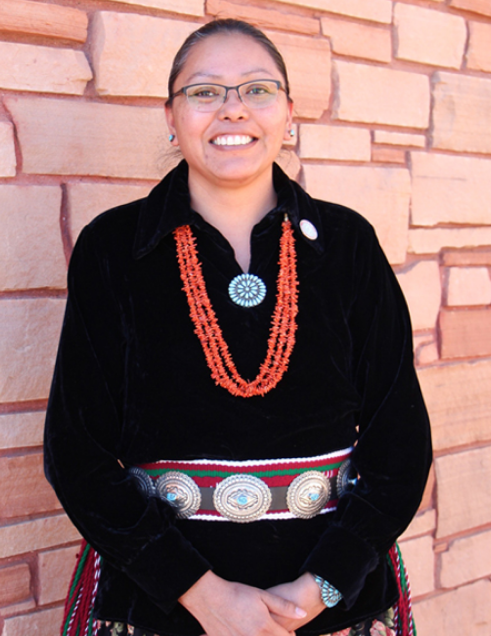
- Details
- By Levi Rickert
WILMINGTON, Del. — President-elect Joe Biden announced Saturday he is adding Dr. Jill Jim, the executive director of the Navajo Nation Department of Health, to his transition team’s coronavirus task force as the incoming administration focuses on preparation to tackle the coronavirus pandemic.
The president-elect also added two Jane Hopkins and David Michaels to the team, which is co-chaired by David Kessler, former Surgeon General Vivek Murthy and Marcella Nunez-Smith.
Formed after Biden in early November was declared president-elect, the task force is charged with helping Biden, Vice President-elect Kamala Harris and the transition cobble together a “robust and aggressive response to contain the virus.”
“As COVID-19 surges across the country, I need a team advising me and a transition that offers diverse perspectives and viewpoints. Dr. Jim, Ms. Hopkins and Dr. Michaels will strengthen the board’s work and help ensure that our COVID-19 planning will address inequities in health outcomes and the workforce,” Biden said.
As the executive director at the Navajo Nation Department of Health, she serves on the Navajo Nation’s Office of President and Vice President’s cabinet.
“I am proud to serve as a member of the Biden-Harris Transition COVID-19 Advisory Board. I look forward to working with fellow members of the advisory board to help prepare an urgent, robust, and professional response to the global public health crisis, for President-elect Biden to lead with on day one,” Dr. Jim said.
The addition of Jim to the task force is viewed as mutually beneficial given the Navajo Nation is the epicenter of the coronavirus in Indian Country, which is closing in on 16,000 Covid-19 positive cases and almost 650 deaths.
“Dr. Jim’s extensive public health experience and expertise has been a major benefit for the Navajo Nation throughout the COVID-19 pandemic and now she will serve on a much broader level to help fight this modern-day monster throughout the country. Our Nation’s COVID-19 preventative measures and restrictions put forth by our public health experts have served as a model for other states and entities across the country. I congratulate her and thank her for her dedication and commitment to helping our Navajo people,” Navajo Nation President Jonathan Nez said.
Jim has worked for 18 years in nonprofit, state and federal agencies and tribal government, where she has largely focused on preventing chronic diseases and tackling health inequalities among Native Americans and Alaska Natives.
The task force was first rolled out earlier this month and has taken the lead in the Biden transition to craft a plan to tackle an array of issues regarding the pandemic, including bolstering testing and contact tracing and the distribution of a potential vaccine.
The additions to the team come amid an alarming spike in COVID-19 cases across the country. There have been more than 12.9 million confirmed cases in the U.S. since the pandemic began, and cases are rising by more than 100,000 daily.
Nearly 256,000 people in the U.S. have died.
More Stories Like This
Native News Weekly (August 25, 2024): D.C. BriefsNative Bidaské: The Illusion of Freedom and the Myth of America 250, Leonard Peltier Speaks Out
Monday Morning (March 2, 2026): Articles You May Have Missed This Past Weekend
Native News Weekly (March 1, 2026): D.C. Briefs
Scope Narrowed, Report Withheld: Questions Mount Over Michigan Boarding School Study
Help us defend tribal sovereignty.
At Native News Online, our mission is rooted in telling the stories that strengthen sovereignty and uplift Indigenous voices — not just at year’s end, but every single day.
Because of your generosity last year, we were able to keep our reporters on the ground in tribal communities, at national gatherings and in the halls of Congress — covering the issues that matter most to Indian Country: sovereignty, culture, education, health and economic opportunity.
That support sustained us through a tough year in 2025. Now, as we look to the year ahead, we need your help right now to ensure warrior journalism remains strong — reporting that defends tribal sovereignty, amplifies Native truth, and holds power accountable.
 The stakes couldn't be higher. Your support keeps Native voices heard, Native stories told and Native sovereignty defended.
The stakes couldn't be higher. Your support keeps Native voices heard, Native stories told and Native sovereignty defended.
Stand with Warrior Journalism today.
Levi Rickert (Potawatomi), Editor & Publisher

